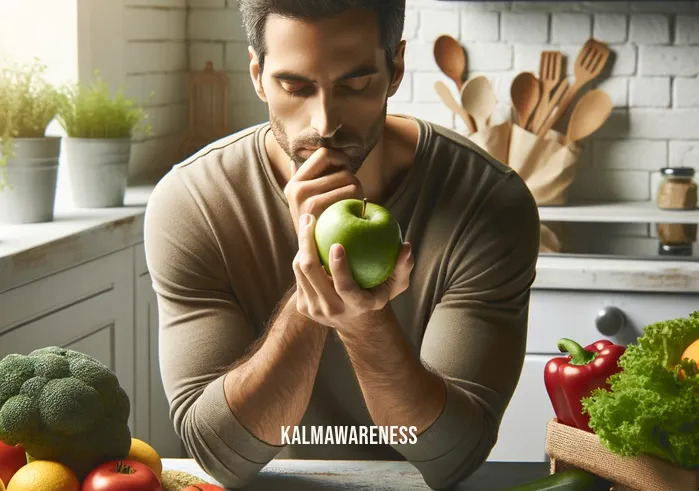Think Before You Eat: An Introduction to Conscious Consumption
Eating is a fundamental aspect of human existence. While the primary goal of consuming food is to obtain necessary nutrients, it’s so much more than just that. The act of eating intertwines with our culture, emotions, physical health, and mental well-being. The contemporary adage, “You are what you eat,” has never been truer. However, as we progress further into the 21st century, the need to think before you eat has become paramount, encompassing not just what we consume, but how and why we do so.
The Paradigm of Health and Well-being
Well-being is a comprehensive term that does not merely represent the absence of disease but a positive state of physical, mental, and emotional health. Modern-day challenges, like stress, have led many of us into a labyrinth of unhealthy eating habits. But the journey towards well-being requires more than just making better food choices. It’s an intertwining path where practices like mindful movement contribute significantly to our overall health.
However, mindful eating isn’t just about physical health. The mental aspect plays a huge role. When we talk about sustainable self-care, it encompasses not only what we eat but the consciousness and intention with which we approach our meals. Nurturing our minds is as essential as nurturing our bodies.
The Confluence of Mindfulness and Eating
Being ‘mindful’ is more than just a buzzword. At its core, mindfulness involves attaining a peaceful state of mind in which thoughts are not occupied by worry. Applying this philosophy to eating transforms the experience.
Think about it: when was the last time you really savored your food without distractions? Incorporating elements of meditation exercises can help focus on the flavors, textures, and aromas of our food, fostering gratitude for the nourishment provided. This blend of physical sustenance and mental awareness offers a dual benefit.
For beginners, stepping into this realm of conscious consumption might seem overwhelming. But resources like Jack Kornfield’s guide make the journey easier and more accessible. It is a process, and every step taken towards mindfulness in eating is a step towards comprehensive well-being.
The Ripple Effects of Conscious Eating
Conscious eating doesn’t just affect our personal health and well-being. The ramifications are far-reaching. When we keep in mind the definition of conscious consumption, it goes beyond personal choices to influence the global food system, the environment, and even socio-economic dynamics. By opting for sustainable, local, and ethical food options, we promote an ecosystem that values every component – from farm to plate.
Moreover, our relationship with food can be a mirror, reflecting deeper internal struggles. Taking the time to gaze into this spiritual mirror can provide insights into aspects of our lives we might have previously ignored. By addressing our food habits, we can catalyze broader personal growth.
Preparing for the Journey Ahead
As we set the stage to delve deeper into the multifaceted world of conscious eating, it is essential to remember that change doesn’t happen overnight. Much like the process of how we get deep insights fast, the journey to mindful eating is incremental. However, every step we take brings us closer to a more harmonious existence with our environment, our communities, and most importantly, ourselves.
The subsequent chapters will unwrap each layer of this intricate topic, providing actionable insights and guiding you through the maze of information. Whether you’re just starting or looking to refine your understanding, the coming segments will shed light on the integral relationship between thinking before eating and holistic well-being.
Stay tuned, and continue reading, as we further explore the profound impact of our daily choices on the tapestry of life.

Unraveling the Layers: The Anatomy of Thinking Before You Eat
In our daily lives, we often eat without much thought. However, what if we took a moment to truly contemplate our food choices? Delving deeper into the concept of “think before you eat,” we find an intricate web of considerations that span across nutrition, environmental impact, and even our personal growth. Let’s break down these layers, enhancing our understanding of what it truly means to eat mindfully.
The Significance of Mindful Eating
As we focus on conscious consumption, it’s paramount to understand the ripple effects of our choices. Not just in terms of health, but also on the environment and society. When we touch upon the importance of knowing our body, it’s not merely about understanding its nutritional needs, but also recognizing the signals it sends. Every bite we take can either contribute to our wellness or detract from it.
Factors to Consider: The Checklist
Before diving into your next meal or snack, pause and go through this quick checklist:
- Awareness: Are you truly present? Try meditating even while lying down to cultivate a habit of being in the moment.
- Nutritional Value: Are the foods nutrient-dense or filled with empty calories?
- Source: Is your food locally sourced? Or has it traveled thousands of miles, accumulating a large carbon footprint?
- Ethical Considerations: Does your food choice support fair labor practices, animal welfare, and sustainable farming methods?
- Emotional State: Are you eating out of hunger or emotions? Understanding this distinction is essential to prevent overconsumption and unhealthy cravings.
Decoding Nutritional Choices: A Comprehensive Table
To better illustrate the notion of thinking before eating, here’s a table showcasing a comparative analysis of common foods, their nutritional benefits, and potential alternatives:
| Food Item | Nutritional Benefits | Healthier Alternatives |
|---|---|---|
| White Bread | Quick energy, some B vitamins | Whole grain bread |
| Fried Chicken | Protein, essential fats | Grilled chicken |
| Soda | Instant energy (sugar) | Herbal teas, fruit-infused water |
| Ice Cream | Calcium, energy from sugars | Frozen yogurt, fruit sorbet |
| Processed Cereal | Quick energy, fortified nutrients | Oats, muesli |
This table serves as a basic guide, but it’s crucial to delve deeper into each category. For instance, understanding the true meaning behind common phrases in nutritional labels can further enlighten our choices.
The Journey of Growth and Wisdom
Our eating habits are more than just routines; they’re reflections of our personal journey. As we evolve, so do our choices. Every time we choose to eat mindfully, we make a decision that aligns with our higher self. It’s not about perfection, but progress. Taking guidance from resources like the judgment of the wise can help in navigating this path.
Preparing for What’s Ahead
As we’ve seen, the concept of “think before you eat” isn’t just a superficial call to make healthier choices. It’s an invitation to connect deeper with ourselves, our environment, and our communities. Our next segment will further shed light on the nuances of this concept, diving into the myriad ways our eating habits shape our lives and the world around us.
Continue reading as we embark on a deeper exploration, bridging the gap between knowledge and application, and learning to nourish not just our bodies, but also our souls.

Harnessing Hope: The Inspirational Side of Thinking Before You Eat
In our journey of mindful eating, inspiration plays a pivotal role. It’s the spark that ignites change, the gentle nudge pushing us towards healthier, more conscious choices. In this chapter, we’ll explore the heartwarming stories, quotes, and lessons that encapsulate the essence of “think before you eat” and its transformative power.
Stories of Change: Real-Life Inspirations
Sarah’s Journey of Sustainable Self-Care: Sarah, a 35-year-old professional, always found herself reaching for junk food in moments of stress. But after a health scare, she decided to make a change. Through the practice of sustainable self-care, she shifted her perspective on food, viewing it as nourishment rather than a temporary fix. Today, Sarah advocates for conscious consumption, leading workshops and inspiring others.
Liam’s Ethical Awakening: A college student, Liam was indifferent about where his food came from. That changed after he attended a seminar on food ethics. He realized the immense power consumers hold, leading him to explore the judgment of the wise. Today, Liam is an ambassador for local, organic produce, changing minds and habits on his campus.
Timeless Quotes that Resonate
In moments of doubt or struggle, words can offer solace and inspiration. Here are some quotes that encapsulate the spirit of thinking before we eat:
“Our bodies are our gardens, to the which our wills are gardeners.” – William Shakespeare.
“When you have your health, you have 1,000 dreams, and when you don’t, you have one.” – Indian Proverb.
“Let food be thy medicine and medicine be thy food.” – Hippocrates.
“It’s not food if it arrived through the window of your car.” – Michael Pollan.
Meditation: A Source of Inspiration
Meditation offers a unique perspective on mindful eating. As we attune ourselves to the present, we naturally gravitate towards better choices. Whether you’re a beginner, seeking guidance through Jack Kornfield’s meditation teachings, or looking for a simplified approach through meditation made easy, this practice can profoundly shift your relationship with food.
Building Bridges: Linking Mind and Plate
Our choices on the plate often mirror our inner state. To truly think before we eat, we must cultivate a peaceful state of mind where thoughts aren’t occupied by worry. This sense of inner calm often spills over, influencing our decisions about food and nourishment.
Gearing Up for What Awaits
As we’ve unearthed in this segment, inspiration is the thread that weaves through the tapestry of mindful eating. It serves as a beacon, guiding us when the path seems unclear. Our upcoming segment will delve into the practical side of things. How can we implement these insights into our daily routine? How can we navigate the challenges and embrace the joys of mindful eating?
Continue reading to unlock a treasure trove of actionable tips, tools, and techniques to revolutionize your relationship with food.
@
The Anatomy of Mindful Eating: Dissecting “Think Before You Eat”
As we navigate the journey of mindful eating, it’s pivotal to grasp the intricacies of “think before you eat.” This chapter delves deeper into this mantra, breaking down its core components. By understanding each facet, we can better embrace its principles and translate them into actionable steps in our daily lives.
The Core Principles of Thinking Before You Eat
Self-awareness: Before we can change our eating habits, we need to understand them. This requires introspection and acknowledgment of our triggers, desires, and patterns. Tools like mirror gazing can offer profound insights into our relationship with food.
Education: Knowledge is power. Understanding the nutritional value, source, and impact of our food choices can significantly influence our decisions. The journey starts with basic questions like how to spell stabilize and evolves into a comprehensive understanding of nutrition.
Mindfulness: This is more than just a buzzword. It’s a practice. Incorporating elements from some meditation exercises, mindfulness allows us to be present during meals, cherishing every bite and recognizing when we’re full.
Intentionality: Every bite we take should be purposeful. Whether it’s for nourishment, pleasure, or both, being intentional prevents mindless snacking and overeating.
Advantages of Embracing Mindful Eating
Physical Health: Reducing overeating, eliminating unhealthy snacks, and making informed choices lead to weight management, better digestion, and reduced risk of diet-related diseases.
Mental Well-being: By aligning our eating habits with our values, we experience less guilt and more joy in our meals. Techniques like gratitude meditation before sleep can further enhance this sense of contentment.
Sustainability: Mindful eating often goes hand in hand with sustainable choices, reducing our carbon footprint.
Holistic Growth: As we start to think before we eat, this mindfulness permeates other areas of our lives. We begin to train our mind to be stronger than our feelings, leading to holistic growth.
Tactics to Foster Mindful Eating
Practice Regular Meditation: Whether you prefer sitting down or wondering if you can meditate lying down, find a method that works for you and stick with it.
Journal Your Meals: Documenting what you eat, how you felt, and your hunger levels can reveal patterns and help in making informed choices.
Seek Community Support: Whether it’s joining a group or following guidelines from one insightful tip for each blessed day, surround yourself with like-minded individuals.
Commit to Continuous Learning: Dive deeper into understanding food, its origins, and its impact. Consider exploring concepts like how we get so deep so fast into topics.
Setting the Stage for the Grand Finale
Understanding the intricacies of “think before you eat” sets a strong foundation. However, knowledge without action is like a ship without a sail. Our final chapter will wrap up this journey, providing actionable steps, resources, and strategies to make mindful eating a lifelong practice.
Continue reading to embark on the conclusive segment of this enlightening journey.
@
Nourishing the Mind and Body: Final Reflections on “Think Before You Eat”
As we reach the culmination of our exploration into the world of mindful eating, it’s essential to pause, reflect, and internalize the wisdom gained from our journey. This final chapter isn’t just a conclusion but a celebration of the enlightenment, understanding, and transformation that the mantra “think before you eat” can bring to our lives.
Our Journey So Far
Our odyssey began with understanding the rudiments of mindful eating, where we emphasized the need for self-awareness and education. As we progressed, we delved deeper, unearthing inspirations and hope related to our central tenet. Through it all, the importance of thinking before consuming has remained our guiding star, pushing us towards healthier choices both mentally and physically.
The Power of Mindfulness
Embracing the principles of “think before you eat” goes beyond mere dietary choices. It’s about cultivating a deeper connection with oneself. By fostering mindfulness, we aren’t just listening to our stomachs but to our hearts and souls. As Jack Kornfield aptly puts it for beginners in meditation, it’s a journey of coming back to ourselves, of homecoming. This philosophy extends to the food we consume.
Lessons Learned
Every chapter has imparted invaluable insights. From understanding the advantages of mindful eating to breaking down its components, we have equipped ourselves with knowledge. But remember, this is just the beginning. The real challenge is attaining a peaceful state of mind, ensuring that every meal becomes a meditative experience. The beauty lies in the continuous evolution and growth, both in our dietary habits and our internal worlds.
Moving Forward
It’s heartening to acknowledge the progress made, but the journey doesn’t end here. It’s an ongoing commitment to oneself. Consider revisiting previous chapters whenever you need a refresher. Or perhaps dive into the world of mindful hypnobirthing, another realm where mindfulness can make a profound difference.
A Hearty Thank You
Your dedication and perseverance in traversing this path with us deserve recognition. We’re immensely grateful for your time and engagement. Rest assured, our commitment to delivering insightful content remains unwavering. We’re excited about the many more enlightening journeys ahead.
Your Next Steps
The world of mindfulness is vast and endlessly fascinating. We encourage you to continue exploring our repository for more gems. Perhaps, start with understanding the holistic approach of sustainable self-care. Every step you take is a step towards a more fulfilled, aware, and vibrant you.
Stay curious, stay nourished, and always remember to think, reflect, and cherish every bite. Until our next enlightening journey together, bon appétit!



